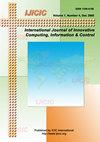Genetic Algorithm Ensemble Filter Methods on Kidney Disease Classification
IF 1.1
Q4 COMPUTER SCIENCE, ARTIFICIAL INTELLIGENCE
International Journal of Innovative Computing Information and Control
Pub Date : 2021-10-31
DOI:10.11113/ijic.v11n2.345
引用次数: 0
Abstract
Kidney failure will give effect to the human body, and it can lead to a series of seriously illness and even causing death. Machine learning plays important role in disease classification with high accuracy and shorter processing time as compared to clinical lab test. There are 24 attributes in the Chronic K idney Disease (CKD) clinical dataset, which is considered as too much of attributes. To improve the performance of the classification, filter feature selection methods used to reduce the dimensions of the feature and then the ensemble algorithm is used to identify the union features that selected from each filter feature selection. The filter feature selection that implemented in this research are Information Gain (IG), Chi-Squares, ReliefF and Fisher Score. Genetic Algorithm (GA) is used to select the best subset from the ensemble result of the filter feature selection. In this research, Random Forest (RF), XGBoost, Support Vector Machine (SVM), K-Nearest Neighbor (KNN) and Naïve Bayes classification techniques were used to diagnose the CKD. The features subset that selected are different and specialised for each classifier. By implementing the proposed method irrelevant features through filter feature selection able to reduce the burden and computational cost for the genetic algorithm. Then, the genetic algorithm able to perform better and select the best subset that able to improve the performance of the classifier with less attributes. The proposed genetic algorithm union filter feature selections improve the performance of the classification algorithm. The accuracy of RF, XGBoost, KNN and SVM can achieve to 100% and NB can achieve to 99.17%. The proposed method successfully improves the performance of the classifier by using less features as compared to other previous work.遗传算法集成滤波在肾脏疾病分类中的应用
肾衰竭会对人体产生影响,可导致一系列严重疾病,甚至导致死亡。与临床实验室测试相比,机器学习在疾病分类中具有很高的准确性和更短的处理时间。慢性肾病(Chronic K idney Disease, CKD)临床数据集中有24个属性,被认为属性过多。为了提高分类的性能,首先采用滤波器特征选择方法对特征进行降维,然后采用集成算法对从每个滤波器特征选择中选择的联合特征进行识别。本研究实现的滤波器特征选择有信息增益(Information Gain, IG)、卡方、ReliefF和Fisher Score。利用遗传算法从滤波器特征选择的综合结果中选择最优子集。本研究采用随机森林(Random Forest, RF)、XGBoost、支持向量机(Support Vector Machine, SVM)、k -最近邻(K-Nearest Neighbor, KNN)和Naïve贝叶斯分类技术对CKD进行诊断。所选择的特征子集对于每个分类器是不同的和专门的。通过对不相关特征进行滤波特征选择,可以减少遗传算法的负担和计算量。然后,遗传算法能够更好地执行并选择能够提高分类器性能的属性较少的最佳子集。提出的遗传算法联合滤波特征选择提高了分类算法的性能。RF、XGBoost、KNN和SVM的准确率可以达到100%,NB可以达到99.17%。与以往的工作相比,该方法通过使用更少的特征,成功地提高了分类器的性能。
本文章由计算机程序翻译,如有差异,请以英文原文为准。
求助全文
约1分钟内获得全文
求助全文
来源期刊
CiteScore
3.20
自引率
20.00%
发文量
0
审稿时长
4.3 months
期刊介绍:
The primary aim of the International Journal of Innovative Computing, Information and Control (IJICIC) is to publish high-quality papers of new developments and trends, novel techniques and approaches, innovative methodologies and technologies on the theory and applications of intelligent systems, information and control. The IJICIC is a peer-reviewed English language journal and is published bimonthly

 求助内容:
求助内容: 应助结果提醒方式:
应助结果提醒方式:


